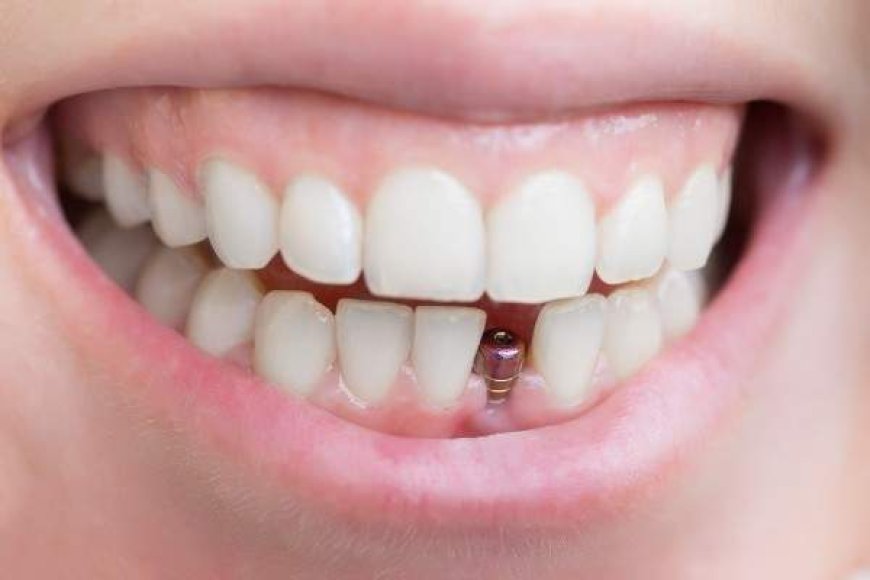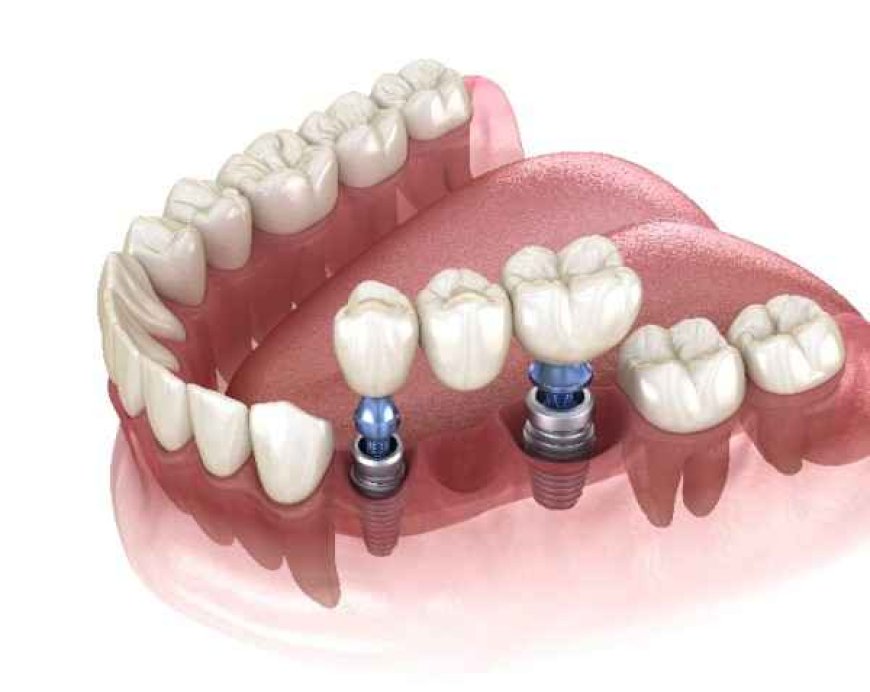Enjoy Your Favourite Foods Again with Dental Implants
Restore your smile and eating comfort with durable dental implants. Expert care and lasting results tailored to your needs for a confident, healthy smile.

Losing a tooth impacts more than your smile it can change the way you eat, speak, and view yourself. Missing teeth can make chewing difficult, limit your diet, and impact your confidence. Dental implants offer a modern, effective solution that feels and functions just like your natural teeth. This guide covers how dental implants work, why they’re such a popular choice, and what you can expect when you consider them as a way to enjoy your favourite foods and smile with confidence once more.
What Exactly Are Dental Implants?
Dental implants are titanium posts inserted into the jawbone, serving as sturdy artificial roots for new teeth. After the implant bonds securely with your bone a process called osseointegration forms a stable base for crowns, bridges, or dentures. This integration makes implants unique compared to other tooth replacement options.
Unlike traditional dentures, which can slip or require adhesives, dental implants remain fixed, providing comfort and security when eating or speaking. They look natural and preserve your facial structure by stimulating your jawbone, preventing bone loss that often accompanies missing teeth.

Key Benefits of Dental Implants
- Strong and stable: Implants anchor firmly in your jawbone, allowing normal biting and chewing.
- Long-lasting: With good care, they often last decades, making them a cost-effective option.
- Preserve bone: By mimicking natural tooth roots, implants prevent jawbone deterioration.
- Natural look: bespoke crowns match your surrounding teeth flawlessly.
- Improved speech: No slipping or clicking sounds, unlike some dentures.
How Missing Teeth Affect Your Eating and Lifestyle
Missing teeth affect far more than appearance alone. It can change how you eat and enjoy food:
- Chewing efficiency drops: Missing teeth make biting into crunchy fruits or meats difficult and sometimes painful.
- Avoidance of certain foods: Many people find themselves skipping their favourite crunchy or chewy treats to avoid discomfort.
- Shift in remaining teeth: Surrounding teeth may shift toward gaps, leading to bite problems or jaw pain.
- Jawbone loss: Lack of stimulation causes the bone to shrink, affecting facial appearance and oral health.
By restoring missing teeth with dental implants, these issues are addressed at the root, allowing you to regain normal chewing function and avoid further oral complications.
Regaining Your Ability to Enjoy Food
A major advantage of dental implants is that they allow you to enjoy a diverse variety of foods with ease and comfort. Because implants are anchored in the jawbone, they distribute chewing forces evenly and securely.
Foods You Can Enjoy Again with Implants
- Crunchy vegetables and fruits: Carrots, apples, and celery regain their crisp appeal.
- Tough proteins: Steak, chicken, and other meats become easier to chew.
- Sticky or chewy treats: You can enjoy snacks like caramel or bagels without worry.
- Nuts and seeds: Nutrient-rich snacks often avoided with dentures become accessible again.
Restoring your bite with dental implants helps you maintain a balanced diet and enjoy mealtimes without frustration or embarrassment.
What to Expect When Getting Dental Implants
The process of getting dental implants is straightforward but requires careful planning and expert care. Here’s an overview:
Initial Consultation and Assessment
Your dentist will review your oral health, take X-rays or 3D scans to assess bone density, and decide if implants are the right option for you. If bone loss is present, additional procedures like bone grafts might be discussed.
Planning Your Treatment
A personalised treatment plan will be developed. This plan details how many implants you’ll need, their placement, and the type of restoration (crown, bridge, or denture).
Surgical Placement of Implants
The titanium implant is carefully placed into your jawbone under local anaesthetic. Most patients report minimal discomfort, similar to a routine dental extraction.
Healing and Osseointegration
Over the next few months, the implant bonds with your jawbone. This period is crucial for long-term stability. Temporary restorations may be provided during this time.
Final Restoration
Once healing is complete, a custom-made crown or bridge is attached to the implant, restoring full function and appearance.
Throughout this process, experienced professionals like a dentist or a dental implant Exeter specialist will ensure your comfort and address any concerns.
Caring for Your Dental Implants
Taking care of implants is similar to natural teeth:
- Brush twice daily with a soft toothbrush.
- Floss carefully to remove plaque around the implant.
- Attend regular dental check-ups to monitor implant health.
- Avoid smoking, which can affect healing.
- Maintain a balanced diet to support oral and overall health.
Good hygiene and routine care help implants last for many years.
How Implants Boost Confidence and Wellbeing
Dental implants do much more than restore function; they transform confidence. Missing teeth can make you feel self-conscious when smiling or speaking, but implants restore a natural-looking smile that feels like your own.
Smiling freely and eating comfortably enhances social interactions and personal wellbeing, lifting overall quality of life. Many clients find that their confidence returns alongside their new implants, leading to a more positive outlook and active lifestyle.
Choosing a skilled dentist or a dental implant clinic is key. These professionals offer expertise and personalised care tailored to your needs, guiding you through every stage with empathy and precision. Their experience ensures treatment is smooth, comfortable, and effective, so you can focus on enjoying the results.
Common Questions About Dental Implants
Does Getting Dental Implants Hurt?
Modern anaesthetic techniques keep discomfort minimal. Most patients compare the sensation to a dental extraction or experience only mild soreness afterward.
How Long Do Implants Last?
With proper care, dental implants can last 15 to 25 years or even longer, often outlasting traditional bridges and dentures.
Are Dental Implants Suitable for Everyone?
Most healthy adults with sufficient jawbone density are good candidates. Your dentist will assess your individual situation to determine suitability.
Why Professional Expertise Matters
The success of dental implants relies on precision. Placement depth, angle, and the number of implants must suit your unique anatomy. A skilled emergency dentist in Exeter or dental implant Exeter specialist ensures the treatment plan is customised, reducing risks like implant failure or poor fit.
Qualified professionals follow strict hygiene standards and stay updated with the latest techniques, using only high-quality materials. This attention to detail maximises comfort during treatment and long-term success.
Planning for the Future
Dental implants require commitment, both time and care. Treatment usually involves multiple visits spread over several months to ensure healing and optimal results.

Many patients find it helpful to coordinate implant visits with regular dental check-ups, making maintenance easier. Setting a routine for oral hygiene and check-ups helps protect your investment and keeps your smile healthy.
Conclusion
Dental implants offer a reliable and natural-feeling way to replace missing teeth, letting you enjoy your favourite foods without hesitation. With expert care from professionals such as those at EDE, treatment is tailored for comfort, function, and long-lasting results. Implants restore more than just your bite; they renew confidence and improve quality of life. By choosing a skilled emergency dentist in Exeter or dental implant Exeter specialist, you can look forward to months and years of worry-free eating and smiling.
























































































